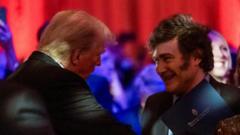In a move reminiscent of former U.S. President Donald Trump, Argentine President Javier Milei has declared that his government will withdraw from the World Health Organization (WHO). The decision comes after significant differences emerged regarding the global health body's handling of the Covid-19 pandemic. A presidential spokesperson specified that Milei’s administration believes this exit is necessary to safeguard Argentina's sovereignty, particularly in health matters.
The timing of this announcement is notable, as it follows closely after Trump's own executive order aimed at commencing the withdrawal of the United States from the WHO. The alignment between the two leaders has been evident, with Milei praising Trump's political resurgence while Trump has referred to Milei as “my favorite president.”
The reasoning behind the withdrawal for both leaders includes concerns over the handling of the pandemic and what they perceive as undue Chinese influence over WHO operations. However, the scale of the impact on WHO finances will differ significantly. The U.S. contributes approximately $950 million annually, accounting for nearly 15% of the organization’s total budget, whereas Argentina’s contribution is roughly $8 million—a number that is not expected to dramatically affect WHO's financial standing.
Milei’s spokesperson, Manuel Adorni, emphasized that Argentina seeks greater autonomy in crafting health policies that align with national interests, which may lead to an abandonment of ties with various international bodies deemed interfering. There are concerns among environmental activists that Milei might also consider withdrawing from the Paris Agreement, which aims to combat climate change.
As President Milei prepares to sign an executive order to formalize Argentina's exit, the geopolitical ramifications remain to be seen. Observers speculate whether other leaders who share similar views to Milei and Trump might follow suit, a situation that could adversely impact WHO's authority as a global health institution as it continues to face scrutiny on how it manages international health crises.
In summary, while Milei’s administration clearly distances itself from global health authorities, the political landscape will be watched closely for reactions and potential shifts from other nations.
The timing of this announcement is notable, as it follows closely after Trump's own executive order aimed at commencing the withdrawal of the United States from the WHO. The alignment between the two leaders has been evident, with Milei praising Trump's political resurgence while Trump has referred to Milei as “my favorite president.”
The reasoning behind the withdrawal for both leaders includes concerns over the handling of the pandemic and what they perceive as undue Chinese influence over WHO operations. However, the scale of the impact on WHO finances will differ significantly. The U.S. contributes approximately $950 million annually, accounting for nearly 15% of the organization’s total budget, whereas Argentina’s contribution is roughly $8 million—a number that is not expected to dramatically affect WHO's financial standing.
Milei’s spokesperson, Manuel Adorni, emphasized that Argentina seeks greater autonomy in crafting health policies that align with national interests, which may lead to an abandonment of ties with various international bodies deemed interfering. There are concerns among environmental activists that Milei might also consider withdrawing from the Paris Agreement, which aims to combat climate change.
As President Milei prepares to sign an executive order to formalize Argentina's exit, the geopolitical ramifications remain to be seen. Observers speculate whether other leaders who share similar views to Milei and Trump might follow suit, a situation that could adversely impact WHO's authority as a global health institution as it continues to face scrutiny on how it manages international health crises.
In summary, while Milei’s administration clearly distances itself from global health authorities, the political landscape will be watched closely for reactions and potential shifts from other nations.



















